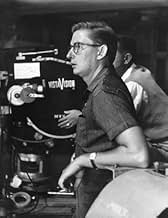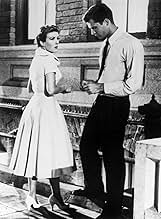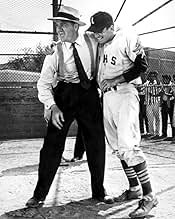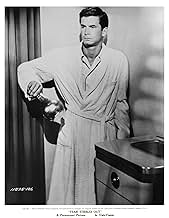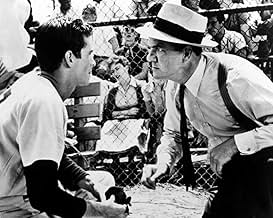VALUTAZIONE IMDb
6,9/10
2254
LA TUA VALUTAZIONE
Aggiungi una trama nella tua linguaTrue story of the life of Jimmy Piersall, who battled mental illness to achieve stardom in major league baseball.True story of the life of Jimmy Piersall, who battled mental illness to achieve stardom in major league baseball.True story of the life of Jimmy Piersall, who battled mental illness to achieve stardom in major league baseball.
- Regia
- Sceneggiatura
- Star
- Premi
- 1 candidatura in totale
John Aberle
- Ballplayer
- (non citato nei titoli originali)
Eric Alden
- Policeman
- (non citato nei titoli originali)
Heather Ames
- Nurse
- (non citato nei titoli originali)
Sam Balter
- Broadcaster
- (voce)
- (non citato nei titoli originali)
Mary Benoit
- Nurse
- (non citato nei titoli originali)
John Benson
- Reporter
- (non citato nei titoli originali)
Don Brodie
- Reporter Evans
- (non citato nei titoli originali)
Richard Bull
- Reporter Slade
- (non citato nei titoli originali)
Bart Burns
- Joe Cronin
- (non citato nei titoli originali)
Edd Byrnes
- Boy in Car Assisting Jimmy Up Stairway
- (non citato nei titoli originali)
Wade Cagle
- Intern
- (non citato nei titoli originali)
Keith Coyne
- Baby
- (non citato nei titoli originali)
Recensioni in evidenza
FEAR STRIKES OUT dealt with a theme not often portrayed in films of the '50s--mental illness--and is a shattering example of how a father's insistence on perfection can have a significant effect on the well being of a sensitive individual unable to meet his father"s expectations. Marketed at time of release as a baseball movie, it's really a relationship movie about a father and son--that is the real heart and soul of the story.
Based on the real life story of Jim Piersall, a well known American sports figure for the Boston Red Sox, as taken from his own account of his life. Slowly the picture emerges of the kind of stress he was under to achieve his goal of playing in the majors, the kind of guilt he felt whenever he did something that aggravated his father--as in simple disobedience when he didn't come straight home after work and then broke his ankle at an ice skating rink.
Even in the midst of achievements, his father finds flaws to criticize. "Wish me luck," he pleads with his father when the Red Sox signs him. "No, luck won't do it. You've got to be thinking and planning all the time."
And later on in the film, after his breakdown and he lands in a mental asylum, he defends his father to his psychiatrist with, "If it hadn't been for him pushing me and driving me, I wouldn't be where I am today!" Chilling words and the scene is the turning point in Piersall's progress toward recovery and the root cause of his problems.
It's the sort of film everyone can relate to, sports minded or not, because it does reveal the danger of parents who expect too much from their children, with tragic results. The scene where Malden tries to take him from the hospital before he's ready to go, is a chiller.
Both ANTHONY PERKINS and KARL MALDEN give the kind of performances that merited at least Oscar nominations--solid and superb.
Summing up: A satisfying, mature drama that takes a penetrating look at the danger of pressure-driven father/son relationships in the sports world where winning is the only thing that counts.
Based on the real life story of Jim Piersall, a well known American sports figure for the Boston Red Sox, as taken from his own account of his life. Slowly the picture emerges of the kind of stress he was under to achieve his goal of playing in the majors, the kind of guilt he felt whenever he did something that aggravated his father--as in simple disobedience when he didn't come straight home after work and then broke his ankle at an ice skating rink.
Even in the midst of achievements, his father finds flaws to criticize. "Wish me luck," he pleads with his father when the Red Sox signs him. "No, luck won't do it. You've got to be thinking and planning all the time."
And later on in the film, after his breakdown and he lands in a mental asylum, he defends his father to his psychiatrist with, "If it hadn't been for him pushing me and driving me, I wouldn't be where I am today!" Chilling words and the scene is the turning point in Piersall's progress toward recovery and the root cause of his problems.
It's the sort of film everyone can relate to, sports minded or not, because it does reveal the danger of parents who expect too much from their children, with tragic results. The scene where Malden tries to take him from the hospital before he's ready to go, is a chiller.
Both ANTHONY PERKINS and KARL MALDEN give the kind of performances that merited at least Oscar nominations--solid and superb.
Summing up: A satisfying, mature drama that takes a penetrating look at the danger of pressure-driven father/son relationships in the sports world where winning is the only thing that counts.
As a previous reviewer said Anthony Perkins did not exactly look like Frank Merriwell out on the field during the baseball scenes, but the film is about the true story of Boston Red Sox centerfielder Jimmy Piersall who sustained a nervous breakdown and then came back to have a pretty respectable major league career.
Showing the personal road Piersall took towards that breakdown is where Anthony Perkins gives one of his great film performances. This film is a lot like I'll Cry Tomorrow where Jo Van Fleet was pushing the career of her daughter Susan Hayward as Lillian Roth so she could have the success that her daughter had vicariously.
That's where the other great performance in the film comes in. Karl Malden is the baseball father, someone with the same dreams, that his son become a major league ballplayer. Malden's success involved being on his factory team, he wanted more and when he couldn't have it drove his son relentlessly to learn the skills and make the grade. But it was some price for Piersall to pay.
I remember Jimmy Piersall as a player when I was a lad. He played for the Red Sox in the years of the Casey Stengel Yankee juggernaut. He was a good contact hitter, didn't hit much for power, but played a flawless centerfield. The Red Sox in the Fifties had little to cheer about. There was a pitching staff of Mel Parnell and a bunch of nobodies. There infield was from hunger with the exception of third baseman Frank Malzone who came up in 1956 the last year Parnell played. But the outfield gave New England something to cheer about with Piersall in center, Jackie Jensen in right, and Ted Williams playing with his back to the Green Monster in left. Piersall covered so much ground in center field he made it real easy on both Williams and Jensen. The Red Sox let him go to the expansion Los Angeles Angels in 1961 where he finished his career. Still he's a Red Sox legend.
The story had been previously done on TV's Climax Theater with Tab Hunter as Piersall. In his recent memoirs Tab said that he had hoped to do the screen version. At the time he was involved in a relationship with Anthony Perkins. Unbeknownst to Hunter, Perkins lobbied and got the part in the film. That sort of put a damper on the relationship.
I also echo other reviewers in wishing that some of Piersall's teammates and others in the Red Sox organization had been portrayed. Only Joe Cronin who was the General Manager at the time is shown on the screen. Legendary owner Tom Yawkey is not portrayed and that is a pity.
Interestingly enough Piersall may have gotten his chance with the Red Sox because of Joe Cronin's racist policies. The Red Sox were the last team in the major leagues to integrate. I remember that very well when Pumpsie Green became their first black player two years after Fear Strikes Out was released.
Fear Strikes Out is unfortunately a two person show with Perkins and Malden the only really developed characters in the film. But those are two very talented persons indeed.
Showing the personal road Piersall took towards that breakdown is where Anthony Perkins gives one of his great film performances. This film is a lot like I'll Cry Tomorrow where Jo Van Fleet was pushing the career of her daughter Susan Hayward as Lillian Roth so she could have the success that her daughter had vicariously.
That's where the other great performance in the film comes in. Karl Malden is the baseball father, someone with the same dreams, that his son become a major league ballplayer. Malden's success involved being on his factory team, he wanted more and when he couldn't have it drove his son relentlessly to learn the skills and make the grade. But it was some price for Piersall to pay.
I remember Jimmy Piersall as a player when I was a lad. He played for the Red Sox in the years of the Casey Stengel Yankee juggernaut. He was a good contact hitter, didn't hit much for power, but played a flawless centerfield. The Red Sox in the Fifties had little to cheer about. There was a pitching staff of Mel Parnell and a bunch of nobodies. There infield was from hunger with the exception of third baseman Frank Malzone who came up in 1956 the last year Parnell played. But the outfield gave New England something to cheer about with Piersall in center, Jackie Jensen in right, and Ted Williams playing with his back to the Green Monster in left. Piersall covered so much ground in center field he made it real easy on both Williams and Jensen. The Red Sox let him go to the expansion Los Angeles Angels in 1961 where he finished his career. Still he's a Red Sox legend.
The story had been previously done on TV's Climax Theater with Tab Hunter as Piersall. In his recent memoirs Tab said that he had hoped to do the screen version. At the time he was involved in a relationship with Anthony Perkins. Unbeknownst to Hunter, Perkins lobbied and got the part in the film. That sort of put a damper on the relationship.
I also echo other reviewers in wishing that some of Piersall's teammates and others in the Red Sox organization had been portrayed. Only Joe Cronin who was the General Manager at the time is shown on the screen. Legendary owner Tom Yawkey is not portrayed and that is a pity.
Interestingly enough Piersall may have gotten his chance with the Red Sox because of Joe Cronin's racist policies. The Red Sox were the last team in the major leagues to integrate. I remember that very well when Pumpsie Green became their first black player two years after Fear Strikes Out was released.
Fear Strikes Out is unfortunately a two person show with Perkins and Malden the only really developed characters in the film. But those are two very talented persons indeed.
This a very interesting, but not totally factual, account of the life of Jimmy Piersall. Piersall was a popular player with the Boston Red Sox. His antics on and off the field are now legendary. Piersall fell in love with baseball at a young age, but his domineering father forced Jimmy to not only achieve, but to play to perfection. Mr. Piersall's constant manipulating can be traced to his son's mental breakdown.
Anthony Perkins puts in a dedicated performance as Jimmy Piersall. Karl Malden excelled as the relentless Mr. Piersall. Also in the cast are Bart Burns, Norma Moore and Adam Williams.
This is a very stark and interesting movie, just don't take all the content as gospel. A baseball fan's delight.
Anthony Perkins puts in a dedicated performance as Jimmy Piersall. Karl Malden excelled as the relentless Mr. Piersall. Also in the cast are Bart Burns, Norma Moore and Adam Williams.
This is a very stark and interesting movie, just don't take all the content as gospel. A baseball fan's delight.
I still remember seeing this as a Little League-age kid in the theater as our family was vacationing in Florida.
When I saw it again, some 40 years later, parts of the film were still very familiar, a testimony to how powerful some of these scenes were. I never forgot them.
This was a based-on-a-true-life account of major league baseball player Jimmy Piersall, a very talented player who suffered a nervous breakdown. The enormous pressure to succeed that was driven into him by his never-satisfied father was pictured as the cause which made him snap.
Anthony Perkins, who plays Piersall, and Karl Madlen, who portrays his dad, are both excellent, riveting characters. Some say this was Malden's best performance ever. Perkins was no slouch, either. This is the classic sports story of an overzealous parent living his or her dreams through their child.
The baseball segment of this film ended about halfway through. From that point, after Perkins breaks down at the park, climbing the backstop fence in a horrifying scene, the film actually gets even more interesting with everyone in the film contributing although the cast, after Perkins and Malden, is a pretty much an unknown-name one.
The only unrealistic part of the film, typical of sports films until the 1980s, was seeing an actor play a ballplayer when he "throws like a girl," as the old expression went. The younger actor playing Piersall as a kid was no better than Perkins in this regard. Neither had a clue how to a throw a ball. It looks corny nowadays.
Oh, well. That wasn't the focus of the story, anyway. As powerful as this film was, it apparently didn't have much of an effect as pushy parents in sports still exist and probably always will, taking the fun out of sports for a number of kids.
It's still a memorable film and worth your time today, especially if you have never seen it.
When I saw it again, some 40 years later, parts of the film were still very familiar, a testimony to how powerful some of these scenes were. I never forgot them.
This was a based-on-a-true-life account of major league baseball player Jimmy Piersall, a very talented player who suffered a nervous breakdown. The enormous pressure to succeed that was driven into him by his never-satisfied father was pictured as the cause which made him snap.
Anthony Perkins, who plays Piersall, and Karl Madlen, who portrays his dad, are both excellent, riveting characters. Some say this was Malden's best performance ever. Perkins was no slouch, either. This is the classic sports story of an overzealous parent living his or her dreams through their child.
The baseball segment of this film ended about halfway through. From that point, after Perkins breaks down at the park, climbing the backstop fence in a horrifying scene, the film actually gets even more interesting with everyone in the film contributing although the cast, after Perkins and Malden, is a pretty much an unknown-name one.
The only unrealistic part of the film, typical of sports films until the 1980s, was seeing an actor play a ballplayer when he "throws like a girl," as the old expression went. The younger actor playing Piersall as a kid was no better than Perkins in this regard. Neither had a clue how to a throw a ball. It looks corny nowadays.
Oh, well. That wasn't the focus of the story, anyway. As powerful as this film was, it apparently didn't have much of an effect as pushy parents in sports still exist and probably always will, taking the fun out of sports for a number of kids.
It's still a memorable film and worth your time today, especially if you have never seen it.
FEAR STRIKES OUT has to be the classic compulsive "sports Dad" movie. I think every father with a son in sports should be required to see this film--especially after what we've seen recently with regard to parents in fist fights at their sons' Little League games. If ever there was an overbearing, driving patriarchal figure trying to live out his past inadequacies through his son in sports, Jimmy Piersall's father was he. In fact, I watch this movie not so much for the Jimmy Piersall story so much as to see Karl Malden's portrayal of John Piersall! Of course, we don't know how much is embellished, but if Mr. Piersall was even half of what is depicted in this movie, it is little wonder that Jimmy Piersall once hit a home run and ran around the bases backwards...
Could anyone play a more iron-fisted character than Karl Malden? Watch PARRISH (1963) or BOMBERS B-52 sometime to see the equal of Piersall's Dad in FEAR STRIKES OUT. And Piersall's mother? Again, no one knows how accurate the depiction is, but she is a ghost presence and if that is true, it's just another nail in Piersall's psychological coffin.
Even watching this movie as a kid, I was uncomfortable seeing Piersall pounded cruelly again and again by his Dad to do better, to go higher, to do more. Once he's romanced by The Boston Red Sox, Mr. Piersall becomes Jimmy's indispensable "advisor." All of this grows until Jimmy can do nothing without consulting Dad. The result is his father's eternal presence between his ears and the classic breakdown scene at the park when Piersall climbs the fence, an unforgettable moment, especially if you see this as an adolescent.
Reviews concerning Anthony Perkins'lack of athletic ability always come up when this movie is discussed. Actually, this was characteristic of most sports movie bio's back in the 1940's and 1950's. Watch William Bendix as Babe Ruth, Ronald Reagan as Grover Cleveland Alexander, or Dan Daily as Dizzy Dean. Routine throwing and catching resembles something you used to see a "nerd" do at school recess. And this movie quirk wasn't present in baseball films only.
I've always wondered just who this movie is about: Jimmy Piersall or his father? The scene in which the psychiatrist confronts Mr. Piersall at the sanitarium is painful and very sad. I've also always wondered just what Piersall's thoughts must have been when this movie hit the screens: for his was still active in the major leagues. How many teams did Jimmy Piersall play for? How many fist fights? And his announcing career? Full of controversy. Maybe it would have all happened without John Piersall, but it is doubtful. Next time a boy wishes his father was more into sports, remind him of John Piersall.
Exhibit 'A' for all fathers living vicariously through the sports achievements of their sons.
Dennis Caracciolo
Could anyone play a more iron-fisted character than Karl Malden? Watch PARRISH (1963) or BOMBERS B-52 sometime to see the equal of Piersall's Dad in FEAR STRIKES OUT. And Piersall's mother? Again, no one knows how accurate the depiction is, but she is a ghost presence and if that is true, it's just another nail in Piersall's psychological coffin.
Even watching this movie as a kid, I was uncomfortable seeing Piersall pounded cruelly again and again by his Dad to do better, to go higher, to do more. Once he's romanced by The Boston Red Sox, Mr. Piersall becomes Jimmy's indispensable "advisor." All of this grows until Jimmy can do nothing without consulting Dad. The result is his father's eternal presence between his ears and the classic breakdown scene at the park when Piersall climbs the fence, an unforgettable moment, especially if you see this as an adolescent.
Reviews concerning Anthony Perkins'lack of athletic ability always come up when this movie is discussed. Actually, this was characteristic of most sports movie bio's back in the 1940's and 1950's. Watch William Bendix as Babe Ruth, Ronald Reagan as Grover Cleveland Alexander, or Dan Daily as Dizzy Dean. Routine throwing and catching resembles something you used to see a "nerd" do at school recess. And this movie quirk wasn't present in baseball films only.
I've always wondered just who this movie is about: Jimmy Piersall or his father? The scene in which the psychiatrist confronts Mr. Piersall at the sanitarium is painful and very sad. I've also always wondered just what Piersall's thoughts must have been when this movie hit the screens: for his was still active in the major leagues. How many teams did Jimmy Piersall play for? How many fist fights? And his announcing career? Full of controversy. Maybe it would have all happened without John Piersall, but it is doubtful. Next time a boy wishes his father was more into sports, remind him of John Piersall.
Exhibit 'A' for all fathers living vicariously through the sports achievements of their sons.
Dennis Caracciolo
Lo sapevi?
- QuizThe real Jimmy Piersall disowned the movie due to its distortion of the facts. Based on the success of his autobiography and the movie, Piersall penned a second book in 1985 called The Truth Hurts, which detailed his ousting from the White Sox organization.
- BlooperClose-up shots of Jimmy Piersall playing shortstop and right field reveal a low outfield wall backed by trees in the background. These games were supposed to be in Fenway Park, which would have a high left field wall and bleachers in right field.
- Citazioni
Jim Piersall: I don't care what happens. I love you Mary!
- ConnessioniFeatured in Diamonds on the Silver Screen (1992)
I più visti
Accedi per valutare e creare un elenco di titoli salvati per ottenere consigli personalizzati
Dettagli
- Data di uscita
- Paese di origine
- Lingua
- Celebre anche come
- Fear Strikes Out
- Luoghi delle riprese
- Azienda produttrice
- Vedi altri crediti dell’azienda su IMDbPro
- Tempo di esecuzione
- 1h 40min(100 min)
- Colore
- Proporzioni
- 1.85 : 1
Contribuisci a questa pagina
Suggerisci una modifica o aggiungi i contenuti mancanti


